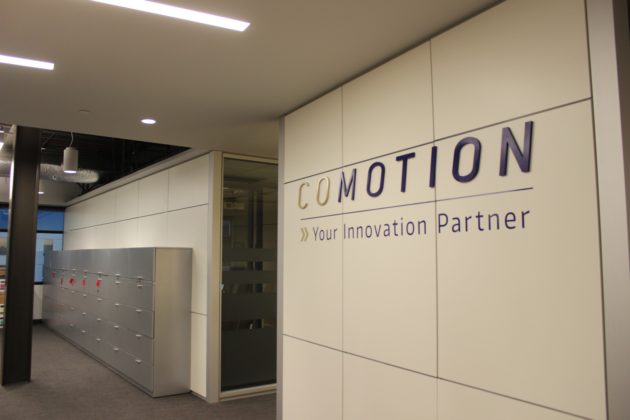
The startup spinout machine at the University of Washington keeps on humming.
According to CoMotion, the university’s tech transfer office, seven startups have emerged from UW-related research since July of last year.
They range from Apetur, which aims to address neurological disorders by using smartphones to measure pupils, to Polyfos, which is developing a form of 3D printing that could increase efficiency of manufacturing.
Most are just getting off the ground as official companies, and some don’t have websites yet.
CoMotion helps UW researchers launch startups and secure patents for their discoveries. The UW’s first tech transfer office originally started in 1983 and was later known as the Center for Commercialization (C4C).
The UW has spun out 52 startups in the past five years, and granted more than 2,000 licenses.
There are currently more than 110 active UW spinouts that employ more than 1,000 people collectively. Those companies have raised more than $4.1 billion over the past five years.
We’ve listed the seven new spinouts below, with descriptions provided by CoMotion. Be sure to check GeekWire’s Startup List for a full database of Pacific Northwest tech startups.
- Apertur (Seattle) is developing a smartphone-based device that measures how the pupils respond to light, without external hardware, and generates data that can help identify neurological disorders. The company, spun out of the Paul G. Allen School of Computer Science & Engineering and the Department of Neurosurgery at UW Medicine, is pursuing FDA approval and research partners in neurocognitive and neurodegenerative disease, acute stroke care, and substance use.
- Axxis Bio (Seattle) is working on a cancer-fighting drug based on a new molecule developed in the labs of David Baker and Neil King at UW’s Institute for Protein Design (IPD). The product is designed to mimic interleukin-21 (IL-21), a type of signaling molecule that has potential to help doctors recognize and eliminate cancer cells, without some of IL-21’s documented limitations. Axxis Bio expects to raise seed funding in the first half of 2024.
- Histone Therapeutics is operating at the forefront of precision epigenetic reprogramming, a field of molecular biology focused on enhancing cell function and treating disease through the controlled regulation of genes. The company’s first asset — developed by UW biochemists and licensed through CoMotion — is a computer-designed protein that can precisely activate genes by rewriting histones, the proteins that regulate DNA, with the potential to establish a new modality for treating disease.
- Kinea Bio (Seattle) is accelerating the development of next-generation gene therapies — based on adeno- associated viruses (AAVs), whose vectors can help deliver larger, more effective therapeutic genes than other approaches — to treat neuromuscular diseases. Developed by researchers in the Institute for Stem Cell & Regenerative Medicine and the Department of Biochemistry, Kinea Bio’s technology is built on an integrated, patient-focused technology platform that applies novel targeting and gene regulation technologies, advanced engineered tissue modeling capabilities, and splicing strategies. Kinea recently received funding from PPMD Ventures.
- Myosana (Seattle), developed by researchers in the Department of Physiology & Biophysics, is pioneering a targeted non-viral gene therapy platform for neuromuscular and cardiac genetic diseases. Its platform, designed to overcome the limitations of viral delivery and expand the range of diseases that doctors can treat with gene therapy, has the potential to improve outcomes and quality of life for patients facing significant unmet needs in this area. The team’s first target is Duchenne muscular dystrophy (DMD), a rare and severe X-linked genetic disorder.
- TopoGene (Seattle) is commercializing high-resolution DNA arrays for use in the field of spatial “omics,” which includes spatial transcriptomics and other assays that enable the mapping of biological tissue. TopoGene’s work is based on a novel application of technologies developed in the lab of UW biochemist Liangcai Gu, which fabricates low-cost, high-quality DNA arrays to analyze biomolecules without separating them from original tissues, such as tumor biopsies. The company, bolstered by NIH STTR funding, will start beta testing later this year.
- Polyfos (Israel) is building solutions to battle climate change and the plague of broken supply chains through multi-material additive manufacturing (MMAM), a form of 3D printing that has the potential to optimize low-volume segments of several industries — automotive, aerospace, medical/dental, and more. Its technology, developed by former UW chemist AJ Boydston, now at the University of Wisconsin-Madison, is the first of its kind to use a novel digital light processing (DLP) solution to address industry automation, productivity, and yield requirements.

